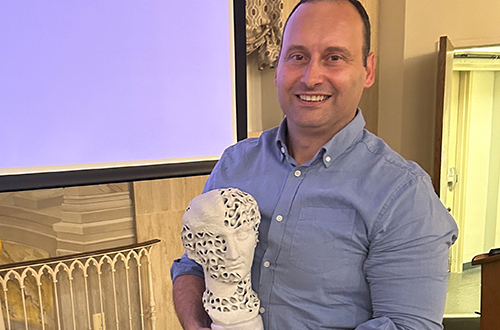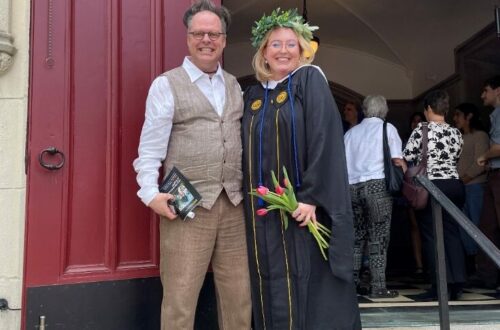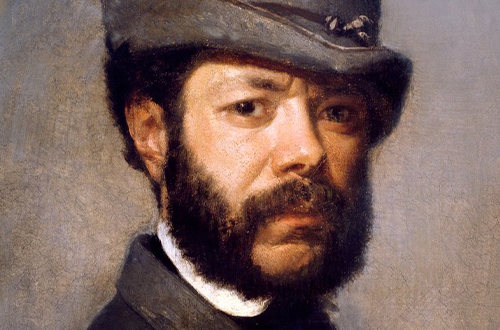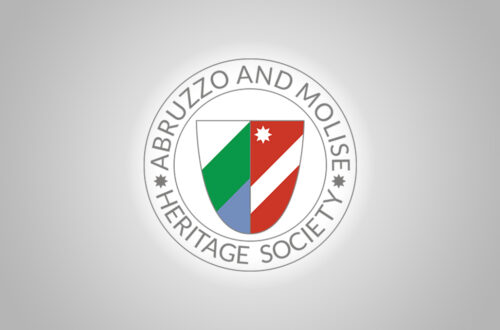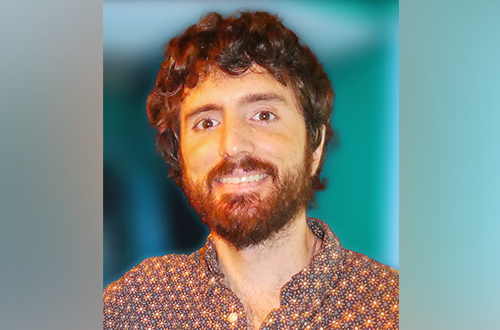-
Italian Sculptor Davide Prete Discusses Wide-Ranging Career in the Arts
By Nancy DeSanti, 1st Vice President—Programs
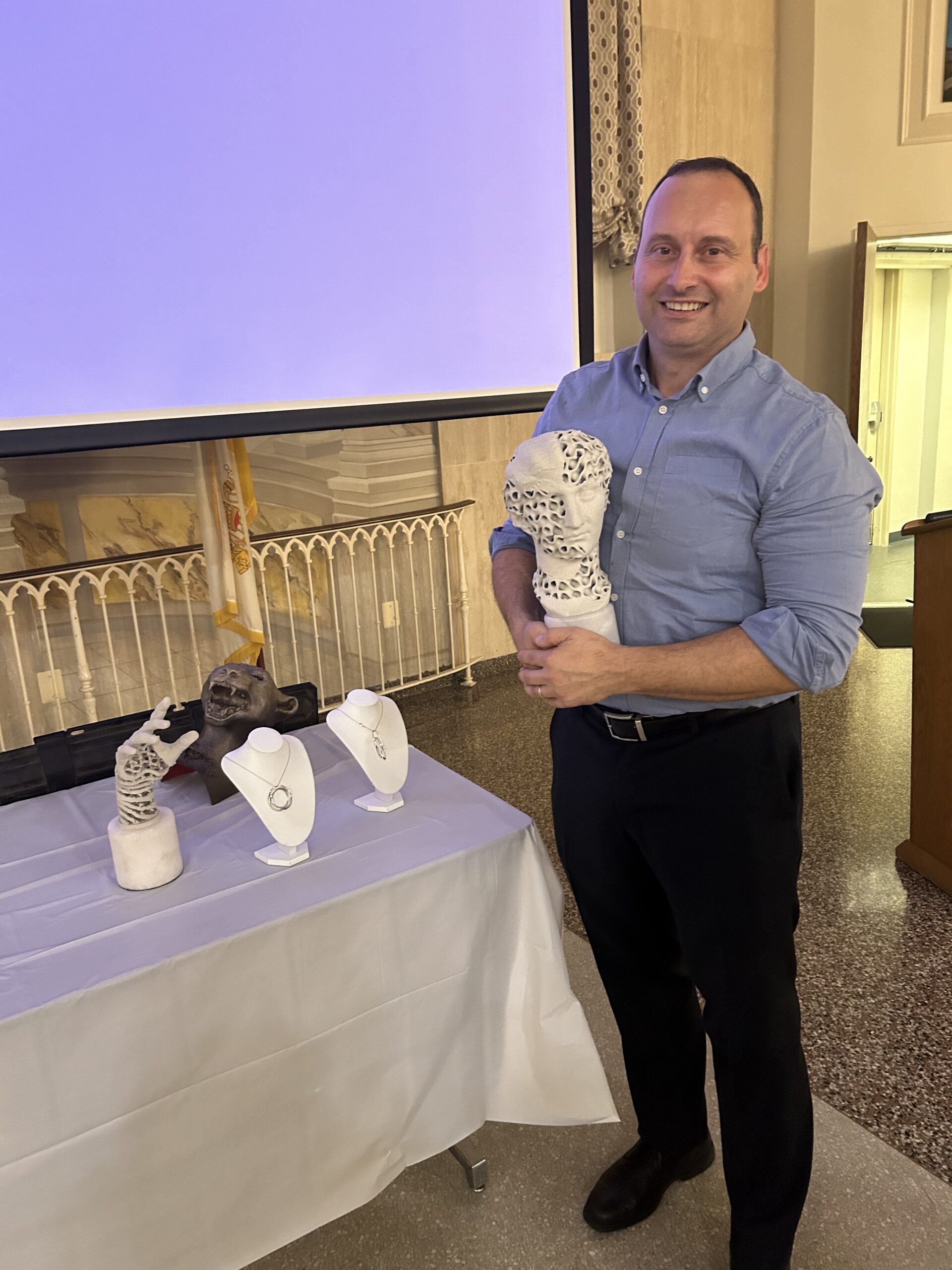
Davide Prete with a sample of his art and jewelry at the September 22 general meeting.
Credit: Nancy DeSanti
In the final AMHS speaker’s program of the year, an enthusiastic audience gathered in Casa Italiana on September 22, 2024, to hear a talk by Italian sculptor, Davide Prete. They enjoyed a wonderful presentation that ranged from metalsmithing to 3D printing, linking traditional craftsmanship with modern technology.
Davide was born in Treviso in northern Italy, where he learned metalsmithing from his father, who in turn learned it from his father. At the age of 8 or 9, Davide learned how to straighten a piece of steel. Later, he studied architecture at a university in Venice, where his interest was sparked in science and mathematics. He was also interested in sports, and in fact became an expert kayaker who went on a whitewater kayaking trip in Africa where, as he showed the audience in a video clip, he learned about connecting with nature and taking risks riding dangerous rapids.
Davide said he was inspired by nature to make sculptures of sundials, the ancient Roman method of keeping track of time. Years later, in considering the environment and climate change, he sculpted a melted-down U.S. Capitol atop an oil can, but he said the summer temperatures were too hot. So, he had to do his work over more than once. He also showed the image he made of a mountain lion as an endangered species that was half metal in the front with 3D plastic in the rear, as if the animal were disappearing.
He noted that he was also inspired by Greek and Roman mythology. He explained that the story of Icarus flying too close to the sun inspired one of the works he donated to the Italian-American Museum of Washington DC (IAMDC). Davide used 3D printing to re-create the “corn cob” of the U.S. Capitol. The “corn cob” was also donated to IAMDC. It can be seen in the museum lobby. During the covid pandemic lockdown, he explained how he spent countless hours making the 3D printed replica based on 200 photos sent to him by the Architect of the Capitol. It was a remarkable undertaking!
Davide’s art is found in over 40 public and private collections in the United States and Europe. He said that, if he had to select his favorite sculpture, it is the one that we chose to put on our flyer for the program. It is the “Freedom to Read” sculpture at the D.C. Capital View Public Library. The large sculpture represents two pages of a book, resembling wings, in white painted steel with laser-cut perforated words from books.
Davide joked that his being used to dealing with the notorious bureaucracy in Italy, such as when he worked on a sculpture for the Treviso airport, made it easy for him to deal with all the red tape he ran into in dealing with local governments here.
One of his big ongoing projects is a U.S. flag consisting of 5,000 portraits. So far, he has 2,000 portraits, Thus, this is a long-term project for him. He is also using 3D printing for making jewelry. Davide will be going to a conference in December on artificial intelligence issues.
In addition to being an artist, Davide is also a teacher. In April of this year, he participated in a project organized by Simonetta Baldassari who links students from two high schools in Italy with two high schools in the Washington area. He gave a virtual presentation to the students. No doubt, it came naturally to him since he teaches at the Corcoran School of Art and Design, the University of the District of Columbia, and Catholic University of America. He is also planning to teach a class next year in Umbria, near Orvieto.
Towards the end of his presentation but before taking questions, Davide wowed the audience by calling on a volunteer from the audience to have a 3D color scan of her face made at his computer in about five minutes.
This program was sponsored by the Abruzzo Molise Heritage Society and co-sponsored by the Casa Italiana Sociocultural Center. A delicious lunch was catered by Fontina Grille. Many thanks is owed to those members who arranged the lunch and served it, and also to those members who donated items for the raffle and bought tickets.
November/December 2024
-
AMHS Scholarship Winners: Where Are They Now?
Updates on the Achievments of Eight of Our Past Recipients
By Julia Paola
Arthur DeFelice, 2003 Scholarship Recipient
Arthur DeFelice received his AMHS scholarship in 2003 while attending George Washington University where he pursued a dual major in Political Science and Criminal Justice. He graduated in 2006 and has since built an impressive academic and professional career. After completing his JD at Roger Williams University School of Law in 2010, Arthur continued his education, earning a Master’s Degree in Defense and Strategic Studies from the U.S. Naval War College in 2023.
Arthur currently works as a state prosecutor in Rhode Island and serves as a JAG Officer in the U.S. Navy Reserve, balancing his commitment to justice and national defense.
In addition to his academic achievements, Arthur has maintained a strong connection to his Italian heritage. Thanks to his brother, Arthur and his siblings have all successfully obtained Italian citizenship. Now, he plans to register his young children as citizens, ensuring that the next generation can enjoy the same connection to Italy.
In the next five years, he hopes to visit Italy with his wife and children, introducing them to the country that has played such a pivotal role in his family’s history and immersing his family in the Italian culture and traditions that he holds dear.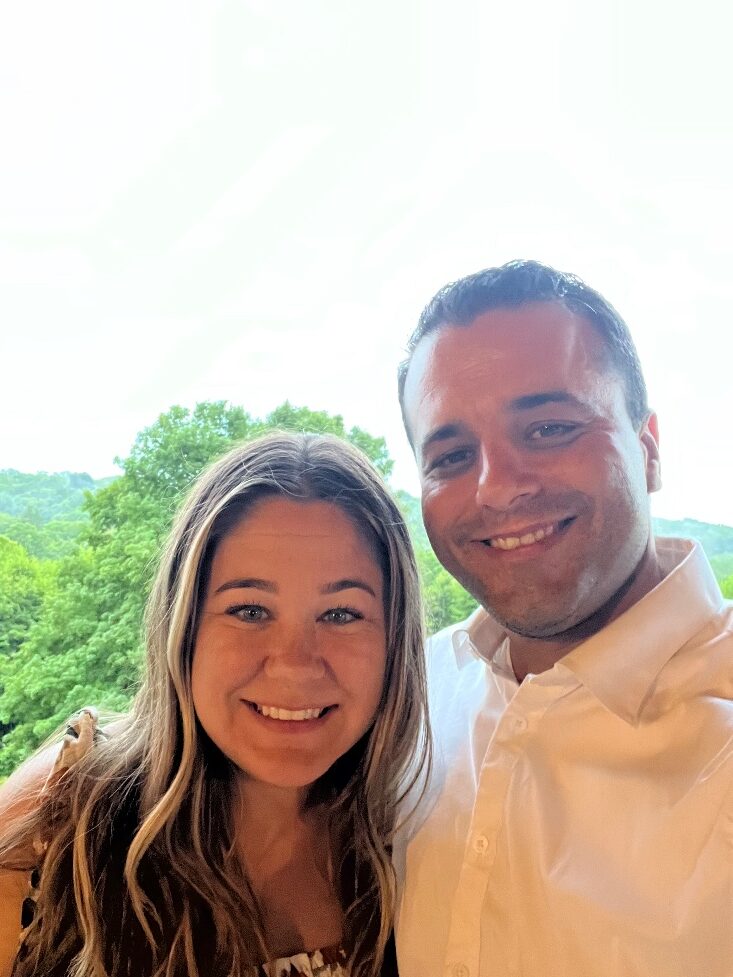
Arthur DeFelice and his wife at a wedding they attended in Rhode Island.
John Scianimanico, Fall 2011 Scholarship Recipient
John Scianimanico received his AMHS scholarship in Fall 2011 while studying at American University where he pursued a Bachelor’s Degree in Political Science with a minor in Italian Language and Culture, graduating in May 2013. During his academic journey, the scholarship enabled him to have a life-changing experience at the University of Modena and Reggio Emilia in Italy. There, he studied European history and translation studies while living alongside Italian students. This arrangement significantly improved his Italian language skills and deepened his appreciation for the culture. Being in the Emilia Romagna region, known as a global food capital, was a bonus to the richness of his time abroad. Since this experience, John has made a personal commitment to return to Italy often to explore other regions and maintain his language proficiency.Currently, John works in education policy for the Connecticut State Department of Education and serves as a reservist with the United States Navy, which has sparked his interest in deploying to Europe and deepening multilateral engagement on national security issues. He sees this work as a meaningful opportunity to serve his country while collaborating with Italians and other NATO partners.
Looking forward, John hopes to keep strong ties to Italy through both personal and professional avenues. He is grateful to the AMHS community for the international experience he received through the scholarship program and to mentors like Ranieri Cavaceppi who invested in his linguistics training throughout his time at the American University.
John Scianimanico enjoying a visit to Sorrento, Italy.
Mattia D’Affuso, 2013 Scholarship Recipient
Mattia D’Affuso was awarded the AMHS scholarship in 2013 to support his studies in both Voice Performance and Italian Language and Literature at James Madison University. With his passion for both music and his Italian heritage, Mattia furthered his education by completing a Master’s Degree in Music Performance and Education in Voice at the University of Tennessee. His Italian roots run deep. His mother and much of his extended family still reside in Italy, and he has visited multiple times since receiving his scholarship. Mattia returned in September 2024 to spend time with his family and to travel across the country.
In addition to his musical background, Mattia has built a thriving career in real estate over the past nine years. Currently, he serves as Vice President at TTR Sotheby’s International Realty in Washington, D.C., and sits on the Young Professionals Board of the Washington National Opera, Bravo.
Looking ahead to the next five years, Mattia plans to further his career with Sotheby’s International Realty, continuing to grow his presence as a leading residential real estate agent. Alongside his professional goals, he hopes to explore other countries in the coming years, expanding his global experiences beyond Italy.
Mattia D’Affuso for Sotheby’s International Realty in Washington, D.C.
Christina Iovino, 2013 & 2015 Scholarship Recipient
Christina Iovino was the recipient of AMHS scholarships in both 2013 and 2015. They supported her studies at the University of Virginia where she graduated in 2017 with a double major in Foreign Affairs and Italian Studies. One of the most transformative experiences during her time at UVA was studying abroad in Siena, Italy, where she lived with a host family. Christina describes this stay as the greatest experience of her life, because it taught her so much about her heritage and how important it is to her. The immersion in Italian culture was a formative experience that she carries with her every day.
Since graduating, Christina has lived in Nashville, Tennessee, where she works in business management within the music industry. While she does not use her Italian language skills daily, her time abroad helped her gain the confidence to navigate different cities and embrace new challenges. She hopes to return to Italy soon to visit her host family, and she is always on the lookout for ways to practice Italian in her current city.
Looking towards the next five years, Christina is exploring the possibility of obtaining dual citizenship in Italy. Ideally, she dreams of combining her love for Italy with her passion for the music industry. In the meantime, Christina enjoys sharing travel recommendations with friends and eagerly counts down the days until her next trip to Italy.
Christina Iovino in Dublin, Ireland.
Kathryn Donati, 2018 Scholarship Recipient
Kathryn Donati received her AMHS scholarship in 2018 while studying abroad in Perugia as a junior at William & Mary University, where she graduated in 2020 with a B.A. in English Literature and Italian Cultural Studies. The time she spent in Italy left a lasting impact because she has remained close with her homestay family and friends, even reuniting with her flat mates in Chicago in 2021 and keeping their “sorellas per sempre” group chat active. Kathryn also makes an annual trip to New York to attend the San Gennaro Festival, a tradition dear to her since she moved out of Brooklyn.
This August, Kathryn returned to Italy for a family wedding in Avella, continuing to explore her deep connection to her heritage. She recently published her thesis and graduated with an M.A. in English from Virginia Commonwealth University. She is currently working as a copywriter and plans to apply for PhD programs in English Literature to allow her to combine her passions for teaching and reading as a literature professor.
In the next five years, Kathryn hopes to live in Italy again while working, exploring, and, of course, eating! She also dreams of raising her future children to be bilingual in English and Italian, because she has found such joy and connection to her heritage through her study of Italian language and culture and cannot wait to pass that on to the next generation.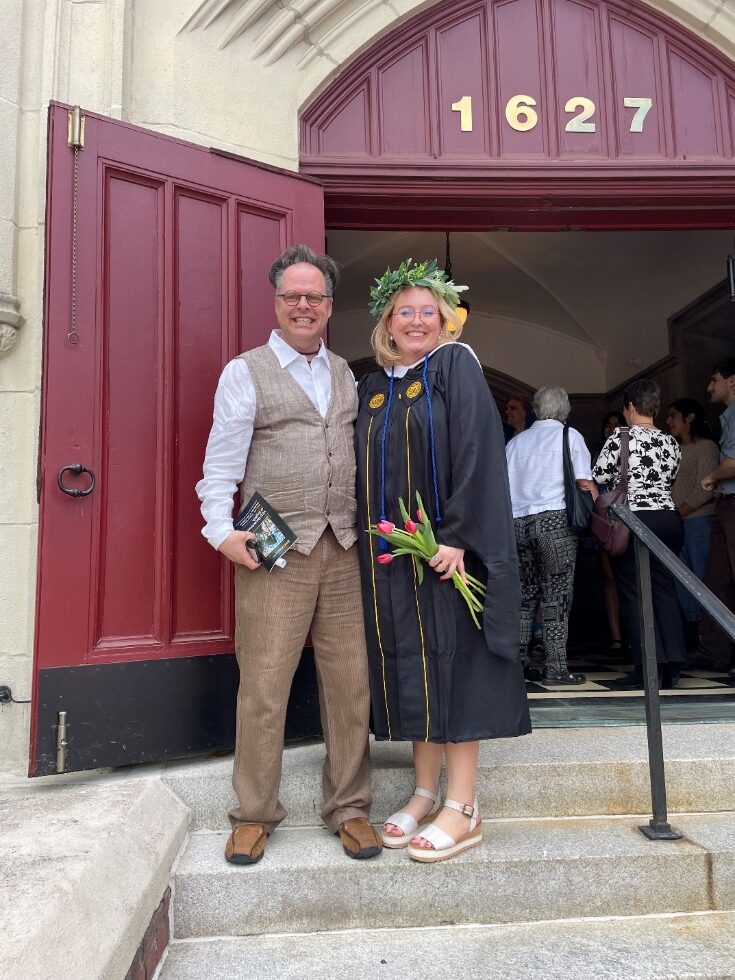
Kathryn Donati on the steps of Grace Covenant Presbyterian Church in Richmond, Virginia, wearing her Italian graduation laurel wreath for her graduation from VCU with her MA.
Thomas Ronan, 2019 Scholarship Recipient
Thomas Ronan received his AMHS scholarship in 2019 while pursuing a Bachelor’s Degree in Italian and Global Medieval Studies at Georgetown University where he graduated in Spring 2023. He grew up spending summers visiting family in Bergamo, Italy, his mother’s hometown.
In Fall 2021, he studied at the University of Bologna through the Brown-in-Bologna program, which gave him the privilege of studying Dante’s Divine Comedy under renowned Dante scholar Giuseppe Ledda. He completed his honors thesis in Italian on Dante’s reasoning for including peculiar similarities between the characters Cato and Matilda in Purgatorio, which had not previously been discussed in scholarship. The summer of 2023 marked another milestone, as Thomas underwent the sacraments of initiation into the Roman Catholic Church, surrounded by his family in Bergamo.
Recently, Thomas returned from a year teaching English in rural Nara, Japan, and has moved back to Memphis, Tennessee, where he lived until he was 8 years old. He is working as a Legal Fellow at The Works, Inc., a community development corporation, where he assists attorneys with anti-blight litigation and neighborhood revitalization projects, including their community land trust initiative in the historic Klondike neighborhood in North Memphis.
Thomas is now planning to apply to law school. As an attorney, he hopes to make a difference against issues negatively affecting strained communities’ well being.
Thomas Ronan in Shirakawago Village, Gifu Prefecture, Japan
Abby Cuviello, 2020 Scholarship Recipient
Abby Cuviello received the AMHS scholarship in 2020 while studying at the University of Vermont, where she pursued a B.S. in Animal Science with a minor in Zoology. She recently graduated in May 2024 and has been focused on combining her passion for animals and science into a meaningful career. She is also hoping to apply for Italian citizenship as a way of honoring and connecting to her heritage.
Abby’s love for animals is evident in her past role at a summer camp in Vermont, where she managed the camp farm, caring for a variety of animals and helping educate the campers. Following that role, she temporarily moved to Memphis, Tennessee, for an internship doing conservation research at the Memphis Zoo. Abby is in the process of applying for veterinary technician positions in Maryland.
Looking forward, Abby hopes to enter veterinary school within the next five years and to focus on studying conservation and wildlife medicine.
Abby Cuviello’s graduation photo on the campus of the University of Vermont.
Sofia DeLuca, 2023 Scholarship Recipient
Sofia DeLuca was awarded the AMHS scholarship in 2023 while pursuing a major in Political Science and a minor in Italian Language and Literature at George Washington University. She graduated in May 2024 and was able to study abroad in Florence due in part to the scholarship.
While in Italy, Sofia had the opportunity to visit her cousins in Rome, spend time with close family friends in Pistoia, and visit family in Borca di Cadore and Lorenzago di Cadore. Her time abroad deepened her connection to her Italian roots, and she expresses immense gratitude to AMHS for helping her make these memories.
Currently, Sofia is preparing for the next chapter of her academic and professional career by applying to law schools in New York City, with plans to attend in 2025. Before starting law school, Sofia hopes to return to Italy for six to eight months during her gap year, aiming to improve further her Italian language skills and to spend more time with her family in Italy.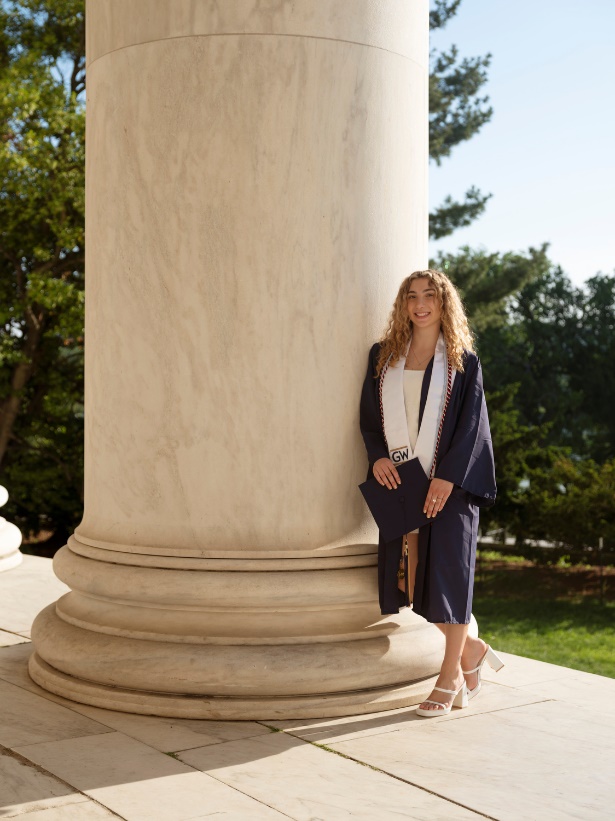
Sofia DeLuca at the Jefferson Memorial after her graduation.
November/December 2024
-
Painter and Art Advocate Filippo Palizzi
By Joseph “Sonny” Scafetta, Jr.

Self portrait by Filippo Palizzi
Credit: WikipediaFilippo Palizzi was born in the small city of Vasto (population 41,409 in the 2017 Census) on the Adriatic coast in the province of Chieti in the region of Abruzzo, on June 16, 1818. When he was 19, he moved to Naples and enrolled in the Royal Institute of Fine Arts.
However, he withdrew after a few months in 1838 to attend a private school run in Naples by the renowned painter, Giuseppe Bonolis (1800-1851), who was a native of the city of Teramo in Abruzzo. Bonolis introduced Filippo to the Posillipo School which had been founded by a group of Neapolitan artists who practiced Italian Verismo (very true) painting.
In 1844, Filippo traveled to Paris to visit his older brother, Giuseppe (1812-1888), who had just moved there and who introduced Filippo to the style of painting practiced by the Barbizon School. (Click HERE to see a profile of Giuseppe Palizzi from the March/April 2023 Notiziario.) Filippo then moved back home to Vasto where he concentrated on nature studies from life. He was inspired by the landscapes and panoramas of the countryside outside Vasto. He looked for small, unknown places and fell in love with them. When he was able to find anything of interest, e.g. high hills, tall trees, water scenes, different types of working men and women with natural expressions, he would quickly sketch them on the spot, then return to his home studio to paint them. He did not plan on great pictorial effects. The simplicity of his paintings contained a beautiful world of color and light, so true and real that it was palpable.
Filippo visited his brother again in 1855 and together they saw the Universal Exhibition in Paris. Filippo then decided to move to the Netherlands to join a colony of Italian artists. While he was living there, he painted his self-portrait in 1860 when he was 42. In 1861, he moved back to Naples where he co-founded the Naples Society for the Promotion of Beautiful Arts which advocated for the need to bring academic teaching up to date. In 1863, he returned to Paris and stayed there until 1867 to take part in the Universal Exhibition which awarded him a gold medal.
Filippo moved back to Naples in 1868 at the age of 60 for the third and last time to settle for the rest of his life. There he opened a studio in the Vico Cupa section of the city. During the next decade, he worked on the handling of light, both in landscapes painted outdoors and in the painting of interiors of rooms with windows. He also painted genre scenes of children with animals. In 1878, he co-founded the Industrial Artistic Museum in Naples. Two years later, he was appointed director of the museum. For Filippo’s work on behalf of the museum, King Umberto I of Italy named him a Commendatore of the Order of the Crown of Italy. Filippo died in Naples on September 11, 1899, at the age of 81.
Sources. All accessed June 6, 2021:
https://en.wikipedia.org/wiki/Filippo_Palizzi
https://www.italianways.com/filippo-palizzi
https://en.wikipedia.org/wiki/Vasto
https://en.wikipedia.org/wiki/Giuseppe_Bonolis
November/December 2024
-
Villalago

By Nancy DeSanti
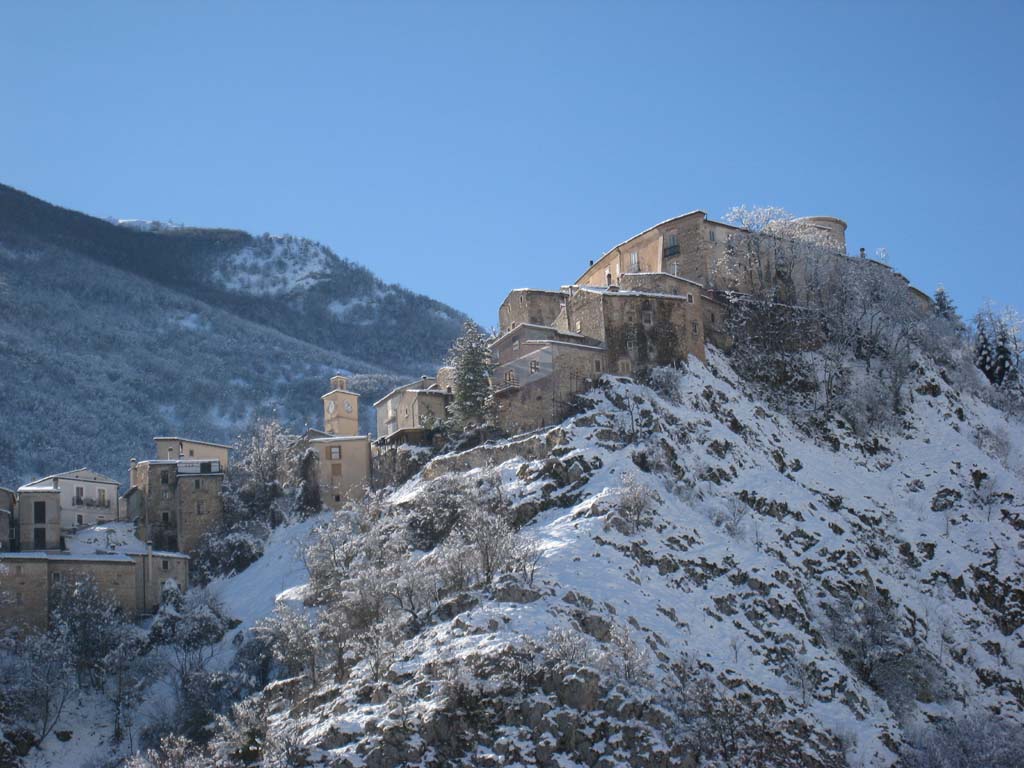
A view of Villalago.
Credit: WikipediaProvince of L’Aquila, Region of Abruzzo
The very beautiful small town of Villalago is in the province of L’Aquila. It has approximately 616 inhabitants, known as Villalaghesi. It is one of I Borghi più belli d’Italia (The most beautiful villages of Italy). Situated in the interior of the Majella National Park, this charming destination offers to the visitors a glimpse of traditional life in the mountains, extraordinary natural beauty, and a rich cultural heritage.
The history of Villalago can be traced back to very ancient times, with evidence of the first settlements in the area. During the medieval period, the village developed as an agricultural and artisanal center, with the local population dedicated to farming, to fishing, and to the traditional crafts. Over the course of the centuries, the architecture and the culture of Villalago were shaped by diverse ruling families, among which were the D’Avalos and the Bourbons.
Villalago is in the interior of the majestic Majella National Park, noted for its rugged mountain landscapes, the pristine forests, and the diversified wildlife. The park offers excellent opportunities for excursions, trekking, and the exploration of nature.
Reaching Villalago, one runs immediately into the imposing Medieval Rock. One time it was a Lombard defensive bulwark, then returned to the community as the principal body of the fortress — the Baronal Palace, today the seat of the Museum of the Crafts that celebrates the rural Abruzzese tradition.
It merits surely a visit to the Church of the Madonna of Loreto that, with its Romanesque characteristics and the Baroque interior, is noted for works of sacred art and for the statue of Saint Dominic of Sora, patron saint of the nearby crystal-clear Lake of Saint Dominic.
The most notable natural marvels of Villalago are its lakes: Pio, Scanno, and San Domenico. The Lake Pio is particularly appreciated by the families, while the Lake Scanno is noted for its characteristic form of a heart, and the Lake San Domenico is an oasis of peace created by man. It invites every person to make regenerative walks and to enjoy panoramic contemplation.
The paths and the panoramas, that open along the shore of the lake or among the trails that lead to the peaks which overlook the town, are a true attraction for the lovers of trekking and naturalistic photography.
The food and the wine of Villalago, enriched by the bonds with the sheep raising and the agriculture, gives to the visitors a taste of the true soul of Abruzzo. Villalago offers a taste of the traditional Abruzzese cuisine, with plates based on ingredients of local origin, among which are herbs and cheeses from the mountains. Local products and ancient recipes, as “cazzelliti and beans” or “pacchiarozze” with sauce of lamb, reflect the simplicity and the goodness of the local products.
Villalago is noted also for its traditional crafts, among which are sculpture in wood and works in wrought iron.What to See
Hermitage of Saint Dominic
Church of the Madonna of Loreto
Church of Michael the ArchangelImportant Dates
- August 22 – Feast of Saint Dominic, Abbot, patron saint
- September 29 – Feast of Saint Michael
Italiano

Tradotto da Ennio Di Tullio
Provincia di L’Aquila, Regione Abruzzo
La bellissima cittadina di Villalago è nella provincia dell’Aquila. Ha circa 616 abitanti, detti Villalaghesi. È uno dei Borghi più belli d’Italia (The most beautiful villages of Italy). Situata all’interno del Parco Nazionale della Majella, questa affascinante destinazione offre ai visitatori uno scorcio della tradizionale vita nelle montagne, straordinarie bellezze naturali, e un ricco patrimonio culturale.
La storia di Villalago può essere fatta risalire a tempi antichissimi, con testimonianze dei primi insediamenti nella zona. Durante il periodo medievale, il paese si sviluppò come un centro agricolo e artigianale, con la popolazione locale dedita all’agricoltura, alla pesca, e ai mestieri tradizionali. Nel corso dei secoli, l’architettura e la cultura di Villalago furono plasmate dalle diverse famiglie regnanti, tra cui erano i D’Avalos e i Borboni.
Villalago si trova all’interno del maestoso Parco Nazionale della Majella, noto per i suoi aspri paesaggi montani, le foreste incontaminate, e la diversificata fauna selvatica. Il parco offre eccellenti opportunità per escursioni, trekking ed l’esplorazione della natura.
Giungendo a Villalago, ci si imbatte subito nell’imponente Rocca Medievale. Un tempo era un baluardo difensivo longobardo, poi restituito alla comunità come il corpo principale della fortezza: il Palazzo Baronale, oggi la sede del Museo dei Mestieri che celebra la tradizione rurale abruzzese.
Merita sicuramente una visita alla Chiesa della Madonna di Loreto che, con le sue caratteristiche romaniche e l’interno barocco, è nota per opere d’arte sacra e per la statua di San Domenico di Sora, patrono del vicino cristallino
Lago di San Domenico.Le meraviglie naturali più notevoli di Villalago sono i suoi laghi: Pio, Scanno, e San Domenico. Il Lago Pio è particolarmente apprezzato dalle famiglie, mentre il Lago di Scanno è noto per la sua caratteristica forma a cuore e il Lago San Domenico è un’oasi di pace creata dall’uomo. Invita ogni persona a fare passeggiate rigeneranti e godere contemplazione panoramica.
I sentieri ed i panorami, che si aprono lungo la riva del lago o tra i sentieri che conducono alle vette che sovrastano il paese, sono una vera attrazione per gli amanti del trekking e la fotografia naturalistica.
Il cibo e il vino di Villalago, arricchita dal legame con la pastorizia e
l’agricoltura, regala ai visitatori un assaggio della vera anima dell’Abruzzo. Villalago offre un assaggio della cucina tradizionale abruzzese, con piatti a base di ingredienti di provenienza locale, tra cui sono erbe e formaggi dalle montagne. Prodotti locali e antiche ricette, come i “cazzelliti e fagioli” o le “pacchiarozze” con sugo di agnello, riflettono la semplicità e la bontà dei prodotti locali.Villalago è nota anche per i suoi mestieri tradizionali, tra cui sono sculture in legno e lavori in ferro battuto.
Attrazioni del luogo:
Eremo di San Domenico
Chiesa della Madonna di Loreto
Chiesa di Michele ArcangeloDate da ricordare:
22 agosto – Festa di San Domenico Abate, santo patrono
29 settembre – Festa di San MicheleNovember/December 2024
-
Siamo Una Famiglia

AMHS Participates in Columbus Day Ceremony
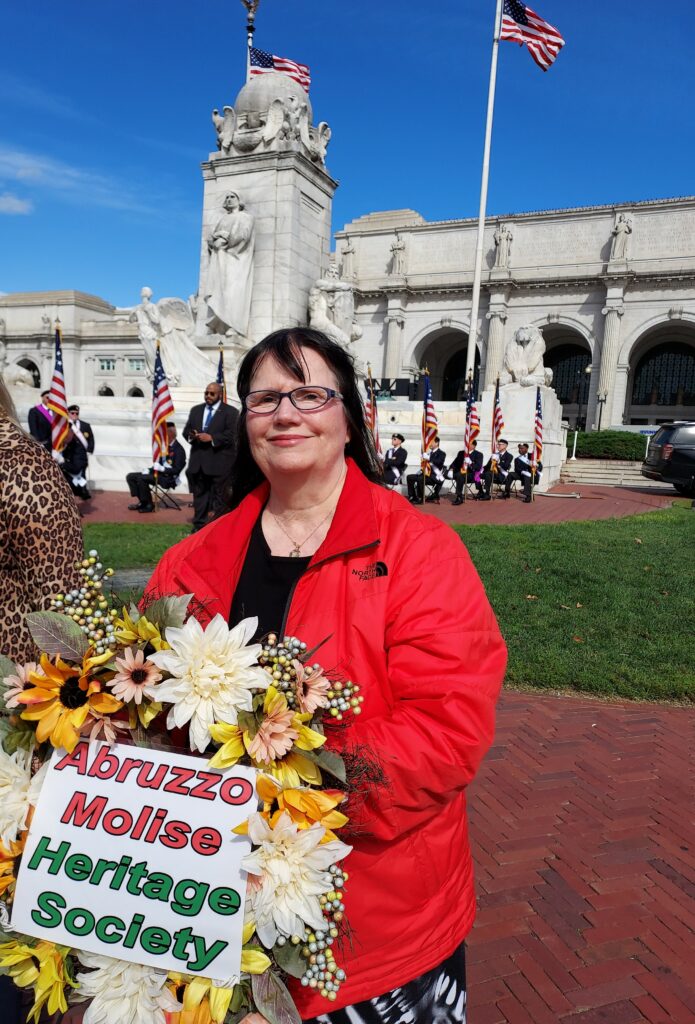
Teresa Talierco (above), a member of the AMHS Board of Directors, presented a wreath before the statue in front of Union Station on Columbus Day, 2024. The annual ceremony is hosted by the National Christopher Columbus Association of which the AMHS is a member organization. Besides Ms. Talierco, other AMHS members present were: President Christopher Rennecker, First Vice President Nancy DeSanti, Secretary Joseph Scafetta Jr.; and members Francesco Isgro’, Mary Ann Re, Jeff Clark, Macarena Clark, and Joseph Scafetta III.
(Credit: Joseph Scafetta, Jr.)Happy Hour at Bar Del Monte
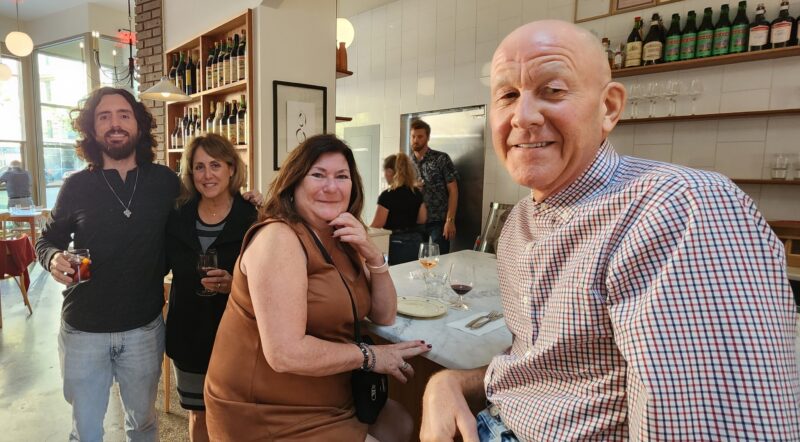
On October 7, AMHS members enjoyed a Happy Hour at Bar Del Monte, a restaurant/bar in Mount Pleasant. The bar serves small plates, including arrosticini. From left, attendees were Chris Renneker, Roberta DiBiasi, Teresa Black, and a friend of AMHS, Mark Bush. (Credit: Maria D’Andrea-Yothers) Just Like Nonna
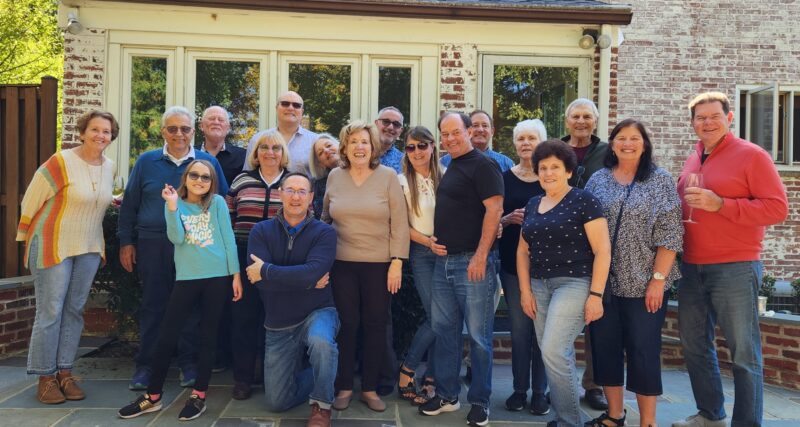
AMHS members who are also members of the Lucchesi nel Mondo/Tuscany Club, enjoyed an outing to AMHS member Eileen Verna’s house, where she hosted a Just Like Nonna cooking class. Oswaldo Barsi taught the group how to make homemade Pasta e Fagioli. AMHS members present included Maria D’Andrea-Yothers, Sam Yothers, Eileen Verna, Jeff Clark, Macarena Clark, Sarah Scott, Bob Tobias, Amy DiFiore, and Matteo DiFiore. A great time was had by all! (Courtesy of Maria D’Andrea-Yothers)
Briscola Games Underway at Casa Italiana
This fall, the once popular Circolo della Briscola was revived, as beginning and experienced players gathered in Casa Italiana for the re-start of the briscola games. The Circolo was popular for 25 years, and its members even won a tournament held in Italy — no mean feat!
Following an organizational meeting on September 15, 2024, the first game was held on October 2. Several AMHS members attended and those present agreed that it was an evening of fun and camaraderie.
Newcomers are welcomed and there will be experienced players to teach them this popular Italian card game. The next game will be held on Wednesday, December 4, at 7 p.m.
The effort to re-start the Circolo was the joint idea of AMHS President Chris Renneker, Dennis Santoli who helped to run the original Circolo, and Francesco Isgro’, President of the Casa Italiana Sociocultural Center.
So, come and bring your family members and friends! If you are interested in playing, please RSVP to Nancy DeSanti at ndesanti7@gmail.com. (By Nancy DeSanti)November/December 2024
